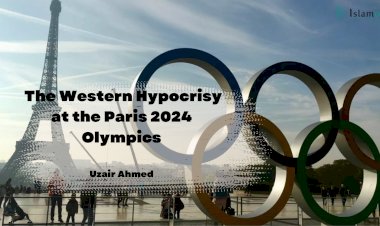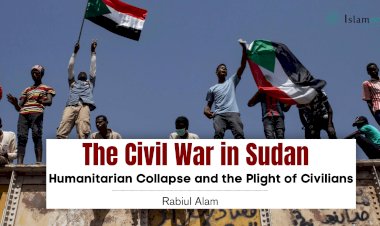The Palestine Question: Intellectual Hypocrisy of the West
The so-called Western imperialist intelligentsia has long used a misguided epistemology to impose a mask of superiority and inferiority over the entire human race. This facade has been repeatedly challenged and exposed, yet it has not led to a decisive global reckoning. However, the ongoing indiscriminate killing of thousands of Palestinians by Israel, a modern occupation power supported by several Western states that once spawned colonialism, starkly reveals the hypocrisy of their claimed superiority—along with their so-called transformative theses on humanity, human rights, justice, democracy, and universality.
The failure of these ideals in their Western adaptation was inevitable, as they were fundamentally crafted out of the same policies that once fueled colonialism. These humanistic elements have been employed primarily to further the mission of neo-imperialism. When this mission fails, these ideals collapse, as is glaringly evident in the case of Palestine. Similarly, “the root cause of Western complicity in Palestinian oppression lies in colonialism and imperialism.”[1]
It is imperative to erase the line of superiority and inferiority imposed on mankind. Under the guise of self-proclaimed superiority—now often termed as modernity and development—this epistemology re-establishes neo-imperialism, invisible today, just as it once created open colonialism. The terminology may have changed, but the actions remain the same. For example, ‘reforms’ have been rebranded as ‘development,’ while ‘savagery’ or ‘barbarism’ has been redefined as terrorism, providing a veneer of legitimacy.
In place of the overt acquisition of foreign territories and the establishment of settlements, modern neo-imperialism forms political, cultural, economic, and administrative hegemony without the need for physical military occupation. Of course, such practices still persist in many regions today. This dependency theory and neocolonialism of the West have been extensively discussed in postcolonial studies. Guyanese historian Walter Rodney, in his 1972 book How Europe Underdeveloped Africa, provides a realistic depiction of this exploitation.[2]
Origin of Superiority and Inferiority Theory
The conception of this monstrous doctrine in Western theory began to take shape after the 15th-16th centuries in Europe, fueled by an uncontrolled explosion of intellectual deviation. Prior to the 15th century, European society, often referred to by historians as the Dark Ages, was characterised by ‘barbarism, ignorance, and superstition.’ Religious persecution, royal authoritarianism, exploitation of peasants and workers, dehumanisation of women, and other absurdities were rampant. Frustrated by these entrenched inconsistencies, scholars of the time began proposing opposing theories—antitheses—as solutions.
Society is polarized into two extremes.[3] Eventually, with the advent of great industrial development, unprecedented scientific breakthroughs, and dramatic lifestyle changes, Europe began to replicate this process in other parts of the world. Armchair thinkers of the era affirmed this as a process of social evolution, claiming that they had progressed from infancy to an ideal civilisation. They argued that similar processes should occur in other parts of the world and that any existing social and environmental norms must be overcome to achieve Western-style progress.
These thinkers asserted the superiority of the West in culture, religion, ethnicity, arts, literature, and all other aspects of civilisation, labelling the rest of the world as inferior and uncivilised. This doctrine of superiority justified their imposition of Western development models on other societies, leading to the onset of colonialism under the guise of reformation.[4]
In fact, the theory of superiority has its origins in Western intellectual development. Charles Darwin initially proposed through his Theory of Evolution that humans, like other biological species, evolved from primitive ancestors through the process of natural selection. However, certain scientists later conflated Darwinism with developments outside of biology. Some experts suggest that this dangerous theory had a clear influence on Hitler’s Nazism, which viewed the Nordic race as superior to others, leading to the horrific genocide of thousands of Jews.[5]
Building on Darwinism, Herbert Spencer applied evolutionary theory to cosmology, philosophy, and the social sciences. English anthropologist Edward Burnett Tylor further entrenched the concept of cultural evolutionism in his book Primitive Culture. He argued, echoing the ideas of French political philosopher Montesquieu, that all cultures evolve through three successive stages: savagery, barbarism, and civilisation. H[6] According to this perspective, the West is now at the pinnacle of civilisation, while the rest are either of the two (savagery, barbarism) - that’s their discourse![7]
On Palestine
However, Western colonial interests faced strong resistance from many parts of the world, particularly in Muslim regions across Africa, the Arab world, and South and Southeast Asia, where Islam served as a powerful anti-colonial force.[8] This spirit of resistance within Islam became a primary target for Western intellectuals. In addition, divisive theories such as the "Clash of Civilizations," proposed by American political scientist Samuel P. Huntington, began to gain traction. These theories provided a foundation for the pervasive support among Western powers for Israeli atrocities against Palestinian Arab Muslims despite the ongoing humanitarian disaster. This reveals the colonial hypocrisy and duplicity masked under the guise of humanity.
Yet, sadly, world intellectuals do not realise that today, over 40,000 Palestinian people, with 33% of them children, 18.4% of women and 8.6% of the elderly, are being killed in broad daylight by Israeli attacks as per the numbers revealed health official in Gaza on 15 August 2024. A CNN assessment of late January says - the conflict has killed one in 100 people in Gaza.[9]
In Palestine, the 365-square-kilometer Gaza Strip has been devastated by relentless Israeli rocket attacks, rendering it uninhabitable. The homeless population, fleeing under the constant threat of missiles, finds no refuge, even as the Israeli army fires rockets as far as Rafah, the last town on the Egyptian border. Surrounded by the Mediterranean Sea, Israeli rockets, and ruins, the Palestinian homeland has become a prison.
After World War II, millions of Jews, finding no protection in Europe, sought refuge in Palestine. Welcomed initially, they established the state of Israel in 1948, inspired by Zionism. Despite international laws, the settlement has threatened the existence of Palestinians in their own homeland. Britain and other Western powers, who claim to seek peace, acted as instigators in this conflict between Jews and Palestinian Arab Muslims.
The movement for a full Palestinian state gained momentum through key historical events: Nakba (1948-49), the Suez Crisis (1956), the Six-Day War (1967), the 1973 Arab-Israeli War, the Lebanon War (1982), the First Intifada (1987-1993), the Second Intifada (2000-2005), and the Gaza Wars. These were notable moments in the struggle for self-rule and freedom.
Millions of Palestinians have been displaced and rendered homeless, many leaving the mantle of the freedom struggle to their children. The world, often subjugated to Western intellectualism, watches in silence. Yet, some have broken free from this bias, protesting for truth and justice. If this reality continues to be ignored, history will surely judge it harshly.
Key References
Al Jazeera. 2023. “Israel-Gaza war in maps and charts: Live tracker.” October 9, 2023. https://www.aljazeera.com/news/longform/2023/10/9/israel-hamas-war-in-maps-and-charts-live-tracker.
Davies, Norman. 1996. Europe: A History. N.p.: Oxford University Press.
Goldsmith, Edward. 2002. “Development As Colonialism.” World Affairs 6 (2). https://ciaotest.cc.columbia.edu/olj/wa/wa_apr02_goe01.html.
Hall, Stuart. n.d. “The West and the Rest: Discourse and Power.” Analepsis. Accessed March 5, 2024. https://analepsis.files.wordpress.com/2013/08/hall-west-the-rest.pdf.
Hopkins, Benjamin D. 2014. Islam and Resistance in the British Empire. N.p.: The Past & Present Book Series (Oxford Academic)). https://doi.org/10.1093/acprof:oso/9780199668311.003.0008.
Kottasová, Ivana, Kareem Khadder, and Richard A. Greene. 2024. “Gaza: One in 100 people has been killed since October 7.” CNN, January 8, 2024. https://edition.cnn.com/2024/01/08/middleeast/gaza-death-toll-population-intl/index.html.
Long, Heather, and Kelly Chakov. n.d. “Social Evolutionism.” The University of Alabama. Accessed March 5, 2024. https://anthropology.ua.edu/theory/social-evolutionism/.
Mannathukkaren, Nissim. 2023. “The hypocrisy of Western democracy.” The Hindu, December 11, 2023. https://www.thehindu.com/opinion/op-ed/the-hypocrisy-of-western-democracy/article67624903.ece.
Rodney, Walter. 1972. How Europe underdeveloped Africa. N.p.: Howard University Press.
Weikart, Richard. 2013. “The Role of Darwinism in Nazi Racial Thought.” German Studies Review 36 (3): 537–56. https://www.jstor.org/stable/43555141
Citations
[1] Mannathukkaren, Nissim. 2023. “The hypocrisy of Western democracy.” The Hindu, December 11, 2023.
[2] Rodney, Walter. 1972. How Europe underdeveloped Africa. N.p.: Howard University Press.
[3] Davies, Norman. 1996. Europe: A History. N.p.: Oxford University Press.
[4] Goldsmith, Edward. 2002. “Development As Colonialism.” World Affairs 6 (2).
[5] Weikart, Richard. 2013. “The Role of Darwinism in Nazi Racial Thought.” German Studies Review 36 (3): 537–56.
[6] Long, Heather, and Kelly Chakov. n.d. “Social Evolutionism.” The University of Alabama. Accessed March 5, 2024.
[7] Hall, Stuart. n.d. “The West and the Rest: Discourse and Power.”
[8] Hopkins, Benjamin D. 2014. Islam and Resistance in the British Empire. N.p.: The Past & Present Book Series (Oxford Academic).
[9] Kottasová, Ivana, Kareem Khadder, and Richard A. Greene. 2024. “Gaza: One in 100 people has been killed since October 7.” CNN, January 8, 2024.
About the author:
Md Sohel Mondal is from Jharkhand. He is a PG Scholar at Department of Civilizational Studies, Darul Huda Islamic University, Kerala. The author regularly writes in English and Bengali on a range of topics focusing on Islam and current affairs. His last book is 15 Characteristics of the Prophet Muhammad.
Disclaimer
The views expressed in this article are the author’s own and do not necessarily mirror Islamonweb’s editorial stance.
























Leave A Comment